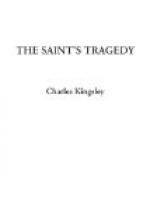Whether Poetry is again to revive among us, or whether the power is to be wholly stifled by our accurate notions about the laws and conditions under which it is to be exercised, is a question upon which there is room for great differences of opinion. Judging from the past, I should suppose that till Poetry becomes less self-conscious, less self-concentrated, more dramatical in spirit, if not in form, it will not have the qualities which can powerfully affect Englishmen. Not only were the Poets of our most national age dramatists, but there seems an evident dramatical tendency in those who wrote what we are wont to call narrative, or epic, poems. Take away the dramatic faculty from Chaucer, and the Canterbury Tales become indeed, what they have been most untruly called, mere versions of French or Italian Fables. Milton may have been right in changing the form of the Paradise Lost,—we are bound to believe that he was right; for what appeal can there be against his genius? But he could not destroy the essentially dramatic character of a work which sets forth the battle between good and evil, and the Will of Man at once the Theatre and the Prize of the conflict. Is it not true, that there is in the very substance of the English mind, that which naturally predisposes us to sympathy with the Drama, and this though we are perhaps the most untheatrical of all people? The love of action, the impatience of abstraction, the equity which leads us to desire that every one may have a fair hearing, the reserve which had rather detect personal experience than have it announced— tendencies all easily perverted to evil, often leading to results the most contradictory, yet capable of the noblest cultivation—seem to explain the fact, that writers of this kind should have flourished so greatly among us, and that scarcely any others should permanently interest us.




